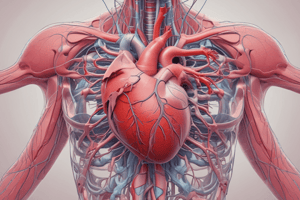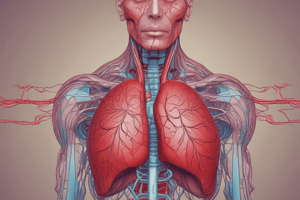Podcast
Questions and Answers
Which blood vessel carries blood away from the heart?
Which blood vessel carries blood away from the heart?
- Venules
- Capillaries
- Veins
- Arteries (correct)
What is the point of convergence between two blood vessels other than capillaries known as?
What is the point of convergence between two blood vessels other than capillaries known as?
- Anastomosis (correct)
- Portal system
- Arterioles
- Venous return
Where is a portal system found in the human body?
Where is a portal system found in the human body?
- Liver (correct)
- Brain
- Heart
- Lungs
What is the volume of blood flowing through a tissue in a given time called?
What is the volume of blood flowing through a tissue in a given time called?
Which organ would experience an increase in blood flow with exercise?
Which organ would experience an increase in blood flow with exercise?
What is the simplest and most common route of blood flow in the body?
What is the simplest and most common route of blood flow in the body?
What is responsible for establishing the pressure gradient in the cardiovascular system?
What is responsible for establishing the pressure gradient in the cardiovascular system?
In which type of flow does the fluid follow a straight path at low flow rates?
In which type of flow does the fluid follow a straight path at low flow rates?
Where is the velocity of blood flow highest during laminar flow?
Where is the velocity of blood flow highest during laminar flow?
Where is the site of greatest resistance in the entire vascular network?
Where is the site of greatest resistance in the entire vascular network?
What type of blood flow can be detected during certain times of the cardiac cycle in the body?
What type of blood flow can be detected during certain times of the cardiac cycle in the body?
What decreases when resistance increases in the cardiovascular system?
What decreases when resistance increases in the cardiovascular system?
Where does the total cross-section of blood vessels increase to its highest value?
Where does the total cross-section of blood vessels increase to its highest value?
What is responsible for generating blood pressure in the cardiovascular system?
What is responsible for generating blood pressure in the cardiovascular system?
Where is the average blood pressure highest in the cardiovascular system?
Where is the average blood pressure highest in the cardiovascular system?
What type of motion does laminar flow exhibit at low flow rates?
What type of motion does laminar flow exhibit at low flow rates?
What is the main function of elastic arteries in the cardiovascular system?
What is the main function of elastic arteries in the cardiovascular system?
What happens to blood pressure if artery walls were rigid and unable to stretch and recoil?
What happens to blood pressure if artery walls were rigid and unable to stretch and recoil?
What is the role of muscular arteries in the cardiovascular system?
What is the role of muscular arteries in the cardiovascular system?
What type of motion do elastic arteries exhibit during systole and diastole?
What type of motion do elastic arteries exhibit during systole and diastole?
What is the primary function of arteries?
What is the primary function of arteries?
Which layer of blood vessels plays the most important role in adjusting the diameter of a blood vessel?
Which layer of blood vessels plays the most important role in adjusting the diameter of a blood vessel?
What happens when the smooth muscle in the vessel wall contracts?
What happens when the smooth muscle in the vessel wall contracts?
What is the outer layer of a blood vessel made of?
What is the outer layer of a blood vessel made of?
Flashcards are hidden until you start studying
Study Notes
Blood Vessels and Circulation
- Arteries carry blood away from the heart.
- The point of convergence between two blood vessels, other than capillaries, is known as an anastomosis.
- A portal system is found in the liver and the hypothalamus-pituitary axis.
- Tissue perfusion refers to the volume of blood flowing through a tissue in a given time.
- During exercise, blood flow to the muscles increases significantly.
- The simplest and most common route of blood flow in the body follows the path from arteries to arterioles to capillaries to venules and then to veins.
- The heart generates the pressure gradient necessary for blood circulation in the cardiovascular system.
Blood Flow Dynamics
- Laminar flow occurs when fluid follows a smooth, straight path, typically at low flow rates.
- Blood flow velocity is highest in the center of the vessel during laminar flow.
- The arterioles exhibit the site of greatest resistance in the vascular network.
- Turbulent flow can be detected during specific phases of the cardiac cycle.
- When resistance increases in the cardiovascular system, blood flow decreases.
Blood Vessel Characteristics
- The total cross-section of blood vessels increases to its highest value in the capillary beds.
- Blood pressure is generated primarily by the contraction of the heart.
- Average blood pressure is highest in the aorta, which is the largest artery.
- Laminar flow exhibits a streamlined motion at low flow rates.
- Elastic arteries function to absorb pressure fluctuations and ensure continuous blood flow.
- If artery walls were rigid and unable to stretch, blood pressure would significantly increase.
Vascular Roles and Functions
- Muscular arteries are responsible for regulating blood flow through vasoconstriction and vasodilation.
- During systole, elastic arteries expand, and during diastole, they recoil to maintain blood pressure.
- The primary function of arteries is to supply oxygenated blood to tissues.
- The smooth muscle layer in blood vessels plays a crucial role in adjusting vessel diameter.
- When smooth muscle in the vessel wall contracts, it leads to vasoconstriction, decreasing vessel diameter.
- The outer layer of a blood vessel, known as the tunica externa, is primarily made of connective tissue.
Studying That Suits You
Use AI to generate personalized quizzes and flashcards to suit your learning preferences.




